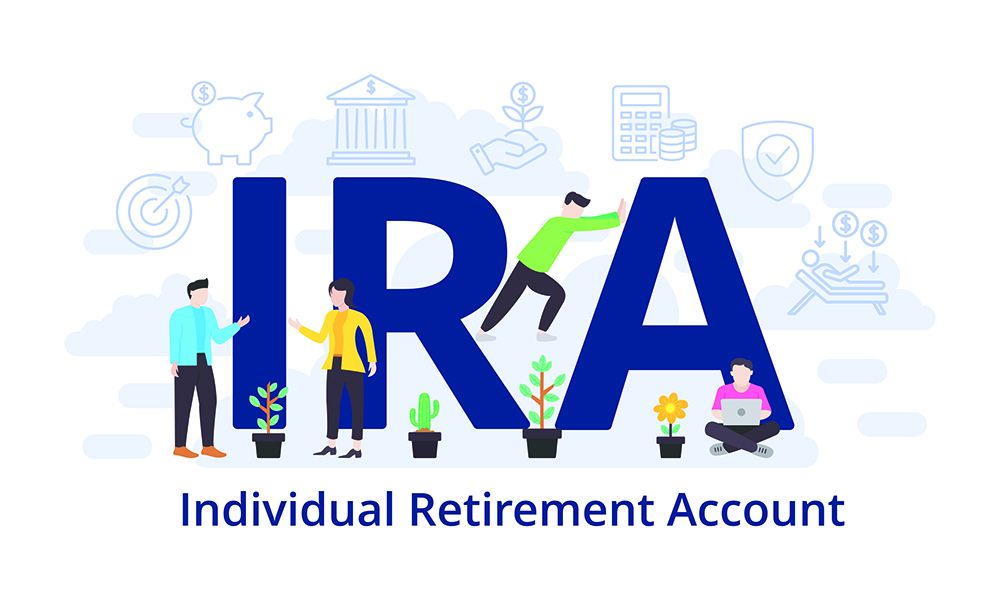1 in 6 retirees are considering a return to work and more than half of them want remote positions, according to a 2023 Paychex survey. Financial reasons were a major factor in the majority of responses.


1 in 6 retirees are considering a return to work and more than half of them want remote positions, according to a 2023 Paychex survey. Financial reasons were a major factor in the majority of responses.

I recently received a financial windfall and wondered if I should invest it or use the extra money to pay down debt.
It depends. First, pay any income taxes that may be due on the windfall. Then, consider paying off high-interest credit card debt before any lower-interest loans.
Determine whether it makes more sense to pay off a low interest mortgage or home equity loan where you can deduct the interest or make more by investing to get higher returns.
If investing, consider adding to your emergency or retirement fund.

Volunteering helps others and gives you a feeling of satisfaction. And it may also give you a tax deduction. To qualify for a deduction, your expenses must directly relate to the charity where you volunteer. Additionally, you must not have been reimbursed for those volunteering expenses and must itemize deductions.
You may deduct expenses for things like postage, paper, printer ink, or other out-of-pocket costs incurred while volunteering. The cost of gear or a uniform, and possibly cleaning services may be deductible.
Any expenses the nonprofit reimburses are not deductible.
If you use your car for volunteer work, you may be able to deduct 14 cents a mile or the cost of your unreimbursed gas but not your car’s maintenance. Other reasonable travel expenses will be tax deductible if tied to your volunteer work. Meals for volunteer service are 100% deductible.
You need to substantiate your volunteer expenses. So, as with any deductible expense, keep accurate records. Retain any paper and electronic
receipts and keep a mileage log. This will help make tracking expenses and providing the details to your tax professional at tax time easier.
Jack retired early and began receiving Social Security benefits. Now he misses working. Can he stop his benefits and start them again in a few years?

Since it’s been more than 12 months since Jack started receiving benefits, he’ll have to wait until he reaches full retirement age to suspend his benefits. Fortunately, that’s only a couple months away.
Temporarily suspending his benefits will then earn him delayed retirement credits and a higher monthly benefit when he resumes payments. When he fully retires, his Social Security benefits will also be boosted by not being subject to federal income tax as they might be if he works and collects benefits.
It’s different for someone who started receiving Social Security within the last 12 months. They’d need to file IRS Form SSA-521, essentially making their situation as if they’d never received benefits (other requirements may apply). And, they’d have to pay back everything they’d received in benefits.
Client Profile is based on a hypothetical situation. The solutions discussed may or may not be appropriate for you.
For federal income tax, the answer is “Yes” and “No,” depending on your divorce agreement date or last modification.
Generally, for agreements entered before January 1, 2019, alimony (separate maintenance payments) is taxed to the recipient spouse and deductible by the payor. The payor doesn’t have to itemize deductions to claim alimony paid. However, for agreements entered in 2019 and later, alimony is neither taxed to the recipient nor deductible by the payor.
If your divorce was before 2019, you can avoid future tax on alimony you receive by having your legal professional amend your agreement. The amendment must explicitly spell out that the repeal of the deduction for alimony payments now applies to payments under your divorce agreement.

What’s your excuse for not having life insurance? For many younger people, it’s cost. About a third of Gen Z and 39% of millennials think they can’t afford life insurance — with many overestimating that $250,000 of term life insurance for a 30-year-old would cost $1,000 or more a year.*
Securing life insurance in your 20s or 30s can be advantageous and more affordable than you think. For example, a $500,000 term life insurance policy might cost you only $30 a month at 25. At age 45, you could have to pay more than $100.* So, taking care of insurance needs while you are young could save you thousands of dollars over time.
The question becomes, “Can you afford not to have proper coverage? It may sound harsh, but do you want to saddle your spouse, partner, or parent with mortgage payments (even for a limited time), other debts, and funeral expenses at a time when they’re grieving and have other life adjustments to worry about?
Life insurance becomes even more critical if you have or plan to have children. You have their future to consider. Talk with your financial professional soon about your life insurance needs.
*Source: LIMRA.com, 2023

Are you thinking of an IRA rollover? Getting these three rules right is critical if you want to avoid a big tax bill.
Your rollover must be completed within 60 days of withdrawal, or it’ll be taxable. You’ll also get hit with a 10% early distribution penalty if you’re under the age of 59 1/2. If you miss the 60-day limit, you may qualify for a rule waiver. The late rollover must be due to one of the IRS specified reasons and completed within 30 days after the specific reason for failing to meet the 60-day requirement.
This rule applies in aggregate to IRAs and Roth IRAs. If you have both types of IRAs, you are still limited to just one 60-day rollover in a IRS-month period. Additional rollovers can result in federal income tax and possible early withdrawal penalties. Some specific exceptions apply.
If you received a cash distribution, cash must be deposited in the rollover IRA. Similarly, if you took your distribution in stocks, you must deposit the same stock shares in the rollover IRA.
Talk to your tax professional.

The Baby Boomers, Generation X, millennials, and Generation Z, who make up most employers’ workforce, have different situations and benefit needs. That’s why increasing numbers of employers are looking beyond a one-size-fits-all plan to multi-generational benefit plans.
The first step in moving your company’s benefit package toward a multi-generational offering is to know your workforce demographics and identify
what the different generations have in common and what their differences are.
The University of North Carolina Kenan-Flagner Business School Guide to Leading the Multi-Generational Workforce identified these age-arcing values: success for the companies; a culture that encourages leaders to lead by example, be accessible, serve as a coach or mentor, challenge employees, and hold them accountable; to enable success in their careers; recognition of different life stages; and expectation of new and unanticipated challenges ahead. Specific to benefits, a Forbes Advisor survey found that Gen Z, Gen X, and baby boomers all prioritize flexible work options, paid time off, and parental leave.
Tailor communications. Baby boomers, for example, value job security and loyalty to their employers. Gen Xers prioritize work-life balance and flexibility. Make all communication clear and easy to understand, and send through multiple channels. Gen X, millennials, and Gen Z have grown up in a digital age of instant information. They prefer short, straightforward messages. Solicit feedback throughout the year and act on it. And measure benefits use over time and adjust your program accordingly.
Motivate employees with incentives that matter to them. To create effective reward programs, consider what inspires (or turns off) certain generations or individuals. Create programs that encourage generations to work together and to share knowledge. Let them know that sharing their knowledge is vital to the success of your organization. For more direction, review your benefits program regularly with your financial professional.

Leasing equipment can be a great option for newer businesses short on cash, while buying may be better in the long run when possible. But the decision isn’t that cut and dried. You need to consider numerous other factors.
Generally, if you have the money and a solid cash flow, buying equipment may prove less costly than leasing. It may also provide more choices, allowing you to shop around, compare prices, and get exactly what you want. In addition, owning builds equity in the equipment, so if you need to sell the equipment, you potentially recover some of your initial cost.
Consider tax benefits. For example, if you finance your purchase, you can typically deduct the interest as a business expense. For some business assets, such as automobiles, you may be able to deduct the vehicle’s depreciation. IRS Section 179 allows businesses to deduct the total purchase price of qualifying equipment purchased or financed during the year (within limits) rather than expensing it.
On the minus side, buying equipment entails higher up-front costs, ties up cash that may be better used for other expenses, and puts the responsibility for all maintenance on your business. Depending on the type of equipment, you also risk obsolescence.
Leasing gives you easy, predictable payments spread over time and leaves the business with more cash for unexpected expenses or business opportunities. It may be a good option if you’re looking to build your credit. You also reduce obsolescence risks if your lease allows for technology updates and regular maintenance is included. As for tax benefits, payments are typically a deductible business expense.
Detractions include a total cost that usually exceeds the purchase price, no equity in the equipment, the leasing company controls maintenance, and you may have limited choices. You also may be unable to alter the lease agreement to best meet your needs.
Need some guidance? Your financial professional has experience with other businesses and can assist you, too.
Should You Lease or Buy – leasing can be a great option if your short on cash while buying may be better in the long run.
A Benefit from B to Z – based on the age or your employees, they have different situations and benefit needs.
What You Need to Know About IRA Rollovers – getting these three rules right is critical if you want to avoid a big tax bill.
Too Young to Need Life Insurance – what’s your excuse for not having life insurance?
Is Alimony Taxable? – for federal income tax, the answer is “Yes” and “No”, depending on your divorce agreement date or last modification.
Claiming Deductions for Volunteer Work – volunteering may give you a tax deduction.
April 2024 Question and Answer
Considering Unretiring? – 1 in 6 retirees are considering a return to work.